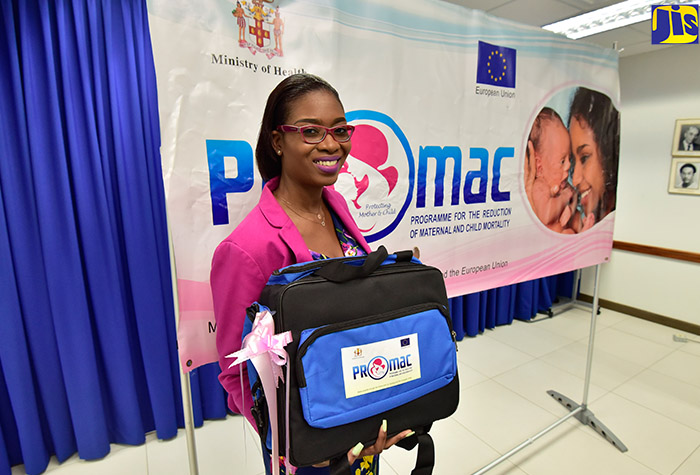Childbearing Women Called on to Make Personal Health Management A Priority
By: , October 9, 2018The Key Point:
The Facts
- According to Acting Director of Health Services, Planning and Integration at the Ministry of Health, Dr. Simone Spence, even though the public health system has been strengthened in recent years to offer critical care for high-risk pregnancies, many women are not doing regular health checks or engaging in physical activity and eating healthy.
- “Some women in reproductive age are overweight or obese, which puts them at increased risk of having challenges when they become pregnant,” she tells JIS News, while sharing outcomes from the €22-million Programme for the Reduction of Maternal and Child Mortality (PROMAC), being implemented at several health institutions.
The Full Story
With Jamaica making steady progress in the reduction of maternal and child mortality, there is a call for childbearing women to make personal health management a priority.
According to Acting Director of Health Services, Planning and Integration at the Ministry of Health, Dr. Simone Spence, even though the public health system has been strengthened in recent years to offer critical care for high-risk pregnancies, many women are not doing regular health checks or engaging in physical activity and eating healthy.
“Some women in reproductive age are overweight or obese, which puts them at increased risk of having challenges when they become pregnant,” she tells JIS News, while sharing outcomes from the €22-million Programme for the Reduction of Maternal and Child Mortality (PROMAC), being implemented at several health institutions.
Dr. Spence, who is also the Coordinator for PROMAC, adds that a grave concern is the number of pregnant women who do not seek medical care until the third trimester of pregnancy, “which is when you are finding that they have other conditions that can impact the health of the pregnancy, so your intervention at that time is sometimes a bit too late”.
She points out that the practice of expectant mothers waiting for weeks to get medical attention inhibits “what could have been prevented, better managed or controlled if they had done medical checks at the start of the pregnancy”.
Dr. Spence outlines that the Ministry, in collaboration with the National Family Planning Board, will be launching a public-awareness campaign to reinforce the health message for both the unborn and pregnant women.
“Key to that is the support that the community gives to women in the reproductive age group,” she says.
While stressing the intake of iron and folic acid for the pregnant woman, Dr. Spence advises that she should be the “healthiest that you can be, in order to have a positive outcome”.
“It is about managing your health, and making sure that you have regular check-ups,” she tells JIS News.
PROMAC is aimed at reducing deaths attributable to high-risk factors for mother and child, by the establishment of high-dependency units (HDUs) at healthcare facilities, with specialist equipment and personnel dedicated to caring for high-risk newborns and pregnant women.
The project is funded by the Government of Jamaica and the European Union (EU), with five core improvement components – Newborn and Emergency Obstetric Care; Quality of Primary Healthcare Services and Referral System; Health Workers Training and Research; Support for the Target Population; and Institutional Support for Project Implementation.
Achievements under the project are commencement of construction for HDUs at the Bustamante Hospital for Children, St. Ann’s Bay, Victoria Jubilee, Cornwall Regional and Spanish Town hospitals; the training of more than 100 primary-healthcare workers in various modules of Neonatal Resuscitation, Obstetric Care and Customer Service; and the completion of a media public-awareness campaign, entitled ‘Healthy Baby, Healthy You’.
There has been project management training, in conjunction with the Management Institute for National Development (MIND), for officers from the Ministry and Regional Health Authorities.
Financing for research through the University of the West Indies (UWI) on the causes and risk factors of premature births, to inform policy for prevention and management, has been provided; and 30 scholarships have been allocated in the Doctor of Medicine programme in Paediatrics, Obstetrics and Gynaecology, and Anaesthesia and Intensive care.
Short courses have been provided at the UWI for scores of health workers in Obstetric Ultrasound and Fundamentals in Neonatal Ventilation, under the contract with that institution; and 50 nurses have been trained in Post-basic Midwifery at the University of Technology (UTech).
Twenty-three nurses were trained in post-basic midwifery at the Kingston School of Nursing, while 25 dieticians and nutritionists have received training under the PROMAC initiative.
Another success story is the procurement of six ambulances for the Mandeville Regional Hospital, the St. Jago Park Health Centre, in St. Catherine; the Annotto Bay and Savanna-la-Mar Health Centres, and the Alexandria and Chapelton Community hospitals.
There has also been the outfitting of health centres and referral hospitals with radiographic and laboratory equipment.
The overall objective of the project is to improve newborn and emergency obstetric care in nine HDUs in five hospitals across the island.




